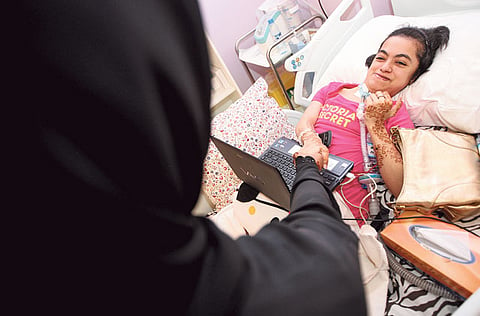Overcoming adversity: Never give up hope
An epic tale of an Emirati girl that will inspire you to set your goals well past your comfort zone

Dubai: She has been on life support for 11 years now. A debilitating neuromuscular disease which struck her at birth has robbed her of the ability to speak or move any part of her body other than her fingers.
But instead of wallowing in self pity, Yusra, 24, has used her indomitable spirit and unbending iron will to achieve the seemingly impossible: An International Baccalaureate milestone (Grade XII) with 81.9 per cent.
The Emirati girl who cannot breathe without a ventilator. completed the challenging curriculum from the confines of a hospital bed and is now qualified to pursue higher education. Lying almost motionless, a laptop propped up on her body – it’s her only means of communication other than a Blackberry Bold – Yusra recounted her inspiring tale of grit and gumption when XPRESS visited her at Abu Dhabi’s Pro-Vita International Medical Centre last month.
“We live only once. So do not stop or be discouraged by the obstacles that come your way,” she typed into the laptop, her fingers flying away on the keyboard in defiance of her adversity. “Life is a blessing,” she said, unmindful of the tube inserted into her windpipe to supply oxygen directly to her lungs.
Insurmountable odds
“A strong person should overcome his circumstances and not give up … I completed my school education while I was in the intensive care unit at Shaikh Khalifa Medical Centre in Abu Dhabi. There were times when I felt lonely. I wanted to sit next to my family. I missed them on special occasions that I could not attend. But I learned to keep myself busy by reading and surfing the internet.” She even has a Facebook and Twitter account.
It hasn’t been easy though. “I will not deny I used to get frustrated and nervous. But I never let anything waver my resolve. By the grace of God, I’ve managed to complete my diploma. Now I want to pursue arts. I want to study and learn something new,” she said, welcoming ideas and help to get started on a suitable project.
“I’ve lived in the confines of a hospital for a very long time. I’ve learned things I would not have learned otherwise,” said Yusra, who moved to Pro-Vita International Medical Centre early this year where she continues to live under ICU-like conditions but in a non-hospital, homely environment.
Yusra’s mother Aisha describes her as an “intelligent girl who wants to study and is curious to know what is happening around the world..”
“As a mother, I know what she’s going through but she doesn’t let it show. I listen to her patiently and encourage her not to lose faith or feel lonely,” said Aisha who has two sons younger than Yusra.
Despite her success, Yusra remains modest and attributes it to the support she gets from her family and friends. “I will never forget my family’s support throughout this tough time. I will also not forget my friends – they visited me constantly and made me laugh. This made me feel happy and cared for.”
The Blackberry Bold next to her signals a new message from a friend. “I love chatting,” she said, her face lighting up with a smile.
Medical care in home setting
Yusra is among 20 patients who stay at Pro-Vita International Medical Centre, a first-of-its-kind facility in the Middle East that offers long-term care for ventilated patients or those requiring continuous medical intervention for serious conditions. But it’s a non-hospital setting which has 60 nurses and three physicians, besides an ambulance at hand in case patients need to be rushed to a hospital.
With a capacity of 40 beds spread across six spacious villas in a compound, Pro-Vita is a unique homely concept of long-term critical care that was brought to the UAE from Germany at the behest of health authorities, said its founder Christina Shawky-Boehme.
The profile of the patients is diverse. Aged between two and 70, they include children suffering from congenital diseases, those with chronic ailments and those requiring post-accident or trauma rehabilitation.
Latifa, for instance, is just three. As Dr Fatma Ridene, Senior Staff Physician, said, she is afflicted with a metabolic disorder called Molybdenum Cofactor Type A Deficiency. With symptoms including seizures, low blood levels of uric acid and high levels of toxicity in urine, such cases require constant monitoring and treatment.
“But being in a non-hospital environment with state-of-the-art medical facilities makes it easier for families to cope,” said Magi Livadaris, Pro-Vita’s general manager, adding that different patients have different themes and colour schemes for their rooms.
In fact, they are encouraged to provide their inputs in doing up their rooms to replicate a home setting. The centre allows patients to bring family photographs and other items from home which they can display by their bedside.
For Bahia, 42, this is a comforting provision as she can even have her three children – aged 11, nine and six - to be with her. An Ajman-based Arabic teacher, she was fine until her third delivery when she was struck by myasthenia, an auto-immune neuromuscular disease leading to severe muscle weakness and fatigue.
“But I like it here as I can be with my children. It’s vacation time now and they are staying with me,” she said.
She said she also spends her time by doing craft work. “I want to become more computer-savvy,” she added.
“There’s a lot they can do here,” said Dr Ridene recalling how Yusra once wanted to make cheesecake. “She directed the centre’s staff to make it by keying in the recipe step by step on her laptop.”
The centre is currently open only for Emiratis who are covered by the Thiqa health insurance.


